HR Management: Effectiveness and Validity of Traditional Interviews
VerifiedAdded on 2020/10/22
|9
|2757
|67
Essay
AI Summary
This essay delves into the effectiveness of traditional interview methods within human resource management, emphasizing their role in candidate selection and recruitment. It explores the advantages of this approach, such as assessing a candidate's overall personality, skills, and experience through open-ended questions and conversational interactions. The essay further examines how to enhance the predictive validity of interviews, focusing on techniques such as analyzing comprehensive data, reducing assumptions, training interviewers, and employing structured rating scales. It acknowledges the limitations of traditional interviews, including the potential for subjective biases and the difficulty in measuring specific technical skills. The essay concludes by highlighting the importance of these methods in making informed hiring decisions and improving employee productivity.
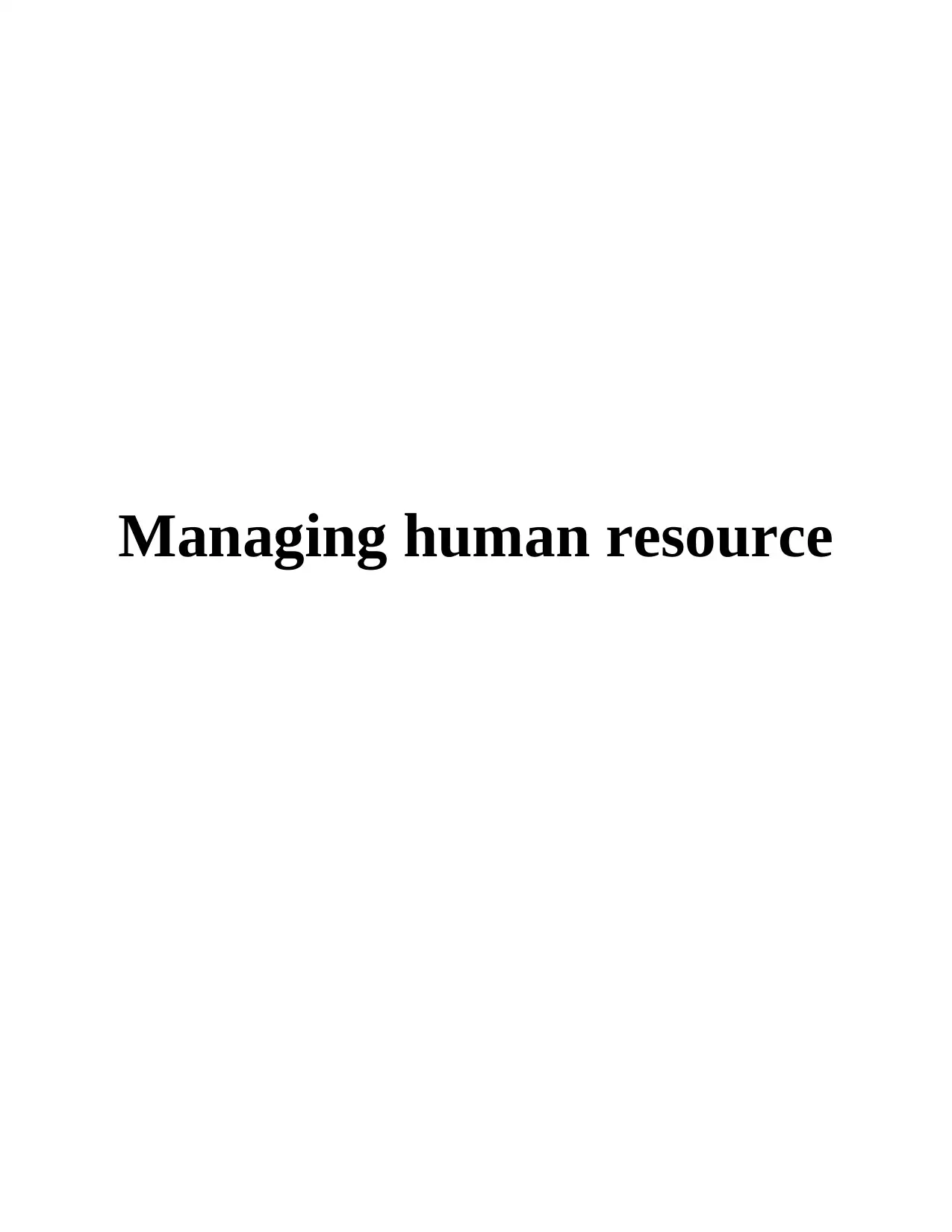
Managing human resource
Paraphrase This Document
Need a fresh take? Get an instant paraphrase of this document with our AI Paraphraser
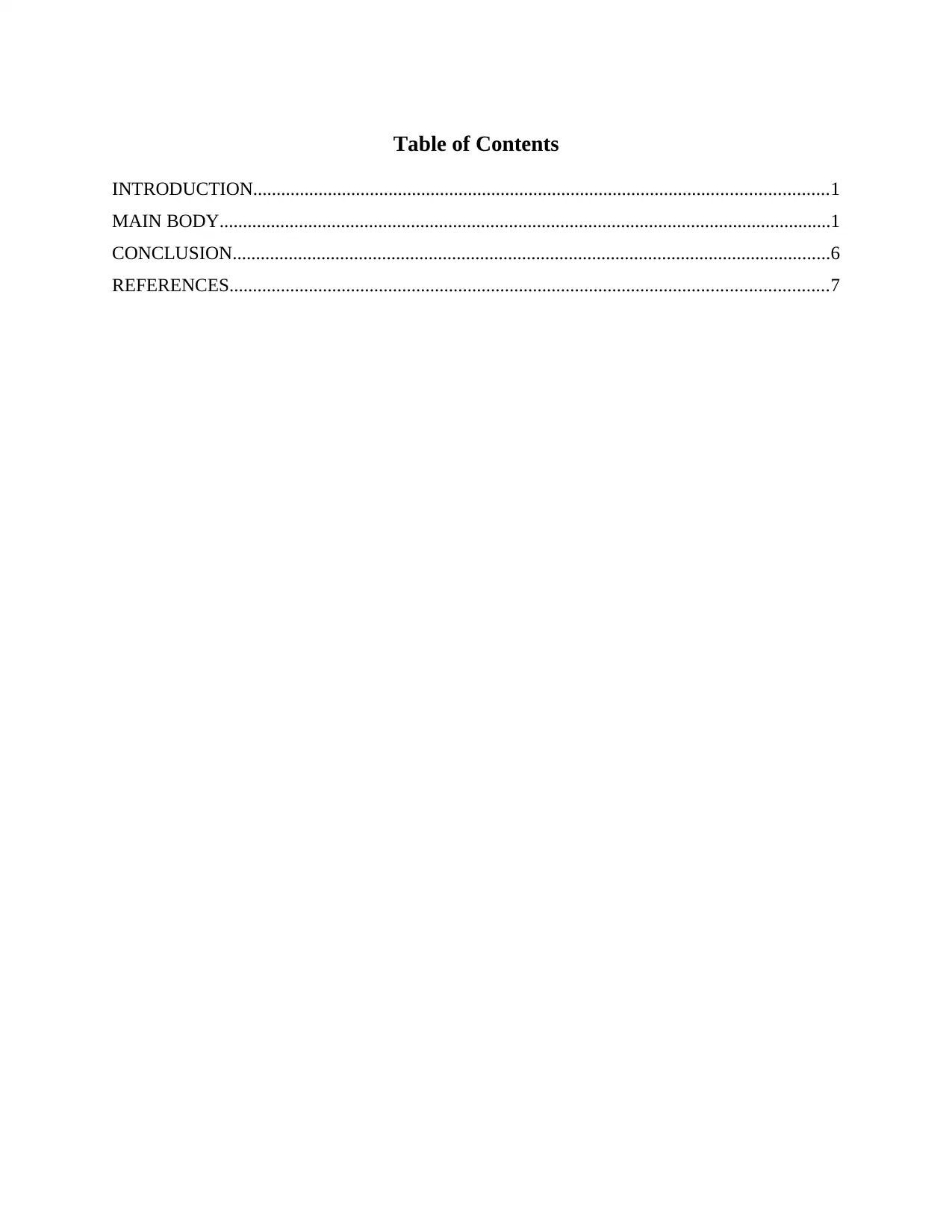
Table of Contents
INTRODUCTION...........................................................................................................................1
MAIN BODY...................................................................................................................................1
CONCLUSION................................................................................................................................6
REFERENCES................................................................................................................................7
INTRODUCTION...........................................................................................................................1
MAIN BODY...................................................................................................................................1
CONCLUSION................................................................................................................................6
REFERENCES................................................................................................................................7
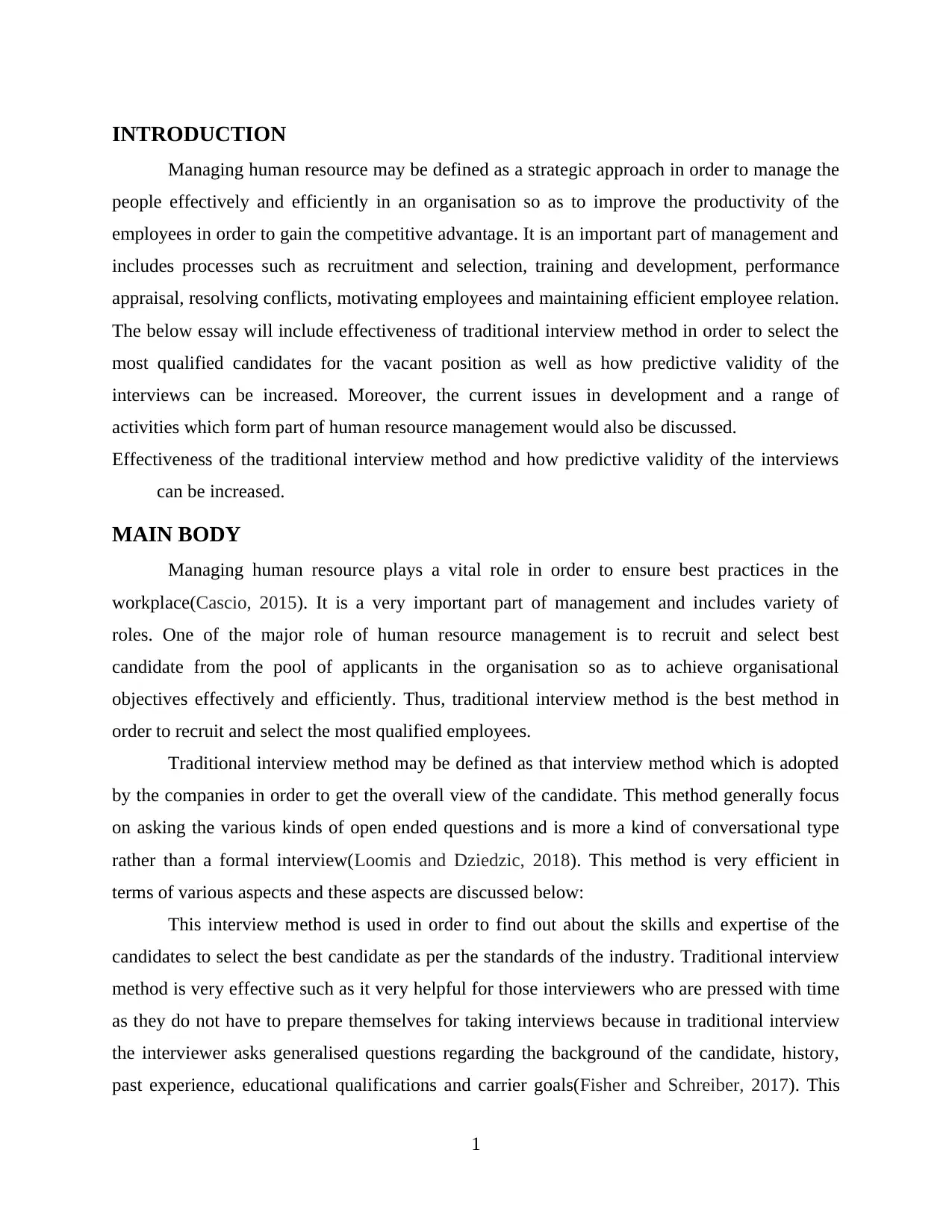
INTRODUCTION
Managing human resource may be defined as a strategic approach in order to manage the
people effectively and efficiently in an organisation so as to improve the productivity of the
employees in order to gain the competitive advantage. It is an important part of management and
includes processes such as recruitment and selection, training and development, performance
appraisal, resolving conflicts, motivating employees and maintaining efficient employee relation.
The below essay will include effectiveness of traditional interview method in order to select the
most qualified candidates for the vacant position as well as how predictive validity of the
interviews can be increased. Moreover, the current issues in development and a range of
activities which form part of human resource management would also be discussed.
Effectiveness of the traditional interview method and how predictive validity of the interviews
can be increased.
MAIN BODY
Managing human resource plays a vital role in order to ensure best practices in the
workplace(Cascio, 2015). It is a very important part of management and includes variety of
roles. One of the major role of human resource management is to recruit and select best
candidate from the pool of applicants in the organisation so as to achieve organisational
objectives effectively and efficiently. Thus, traditional interview method is the best method in
order to recruit and select the most qualified employees.
Traditional interview method may be defined as that interview method which is adopted
by the companies in order to get the overall view of the candidate. This method generally focus
on asking the various kinds of open ended questions and is more a kind of conversational type
rather than a formal interview(Loomis and Dziedzic, 2018). This method is very efficient in
terms of various aspects and these aspects are discussed below:
This interview method is used in order to find out about the skills and expertise of the
candidates to select the best candidate as per the standards of the industry. Traditional interview
method is very effective such as it very helpful for those interviewers who are pressed with time
as they do not have to prepare themselves for taking interviews because in traditional interview
the interviewer asks generalised questions regarding the background of the candidate, history,
past experience, educational qualifications and carrier goals(Fisher and Schreiber, 2017). This
1
Managing human resource may be defined as a strategic approach in order to manage the
people effectively and efficiently in an organisation so as to improve the productivity of the
employees in order to gain the competitive advantage. It is an important part of management and
includes processes such as recruitment and selection, training and development, performance
appraisal, resolving conflicts, motivating employees and maintaining efficient employee relation.
The below essay will include effectiveness of traditional interview method in order to select the
most qualified candidates for the vacant position as well as how predictive validity of the
interviews can be increased. Moreover, the current issues in development and a range of
activities which form part of human resource management would also be discussed.
Effectiveness of the traditional interview method and how predictive validity of the interviews
can be increased.
MAIN BODY
Managing human resource plays a vital role in order to ensure best practices in the
workplace(Cascio, 2015). It is a very important part of management and includes variety of
roles. One of the major role of human resource management is to recruit and select best
candidate from the pool of applicants in the organisation so as to achieve organisational
objectives effectively and efficiently. Thus, traditional interview method is the best method in
order to recruit and select the most qualified employees.
Traditional interview method may be defined as that interview method which is adopted
by the companies in order to get the overall view of the candidate. This method generally focus
on asking the various kinds of open ended questions and is more a kind of conversational type
rather than a formal interview(Loomis and Dziedzic, 2018). This method is very efficient in
terms of various aspects and these aspects are discussed below:
This interview method is used in order to find out about the skills and expertise of the
candidates to select the best candidate as per the standards of the industry. Traditional interview
method is very effective such as it very helpful for those interviewers who are pressed with time
as they do not have to prepare themselves for taking interviews because in traditional interview
the interviewer asks generalised questions regarding the background of the candidate, history,
past experience, educational qualifications and carrier goals(Fisher and Schreiber, 2017). This
1
⊘ This is a preview!⊘
Do you want full access?
Subscribe today to unlock all pages.

Trusted by 1+ million students worldwide
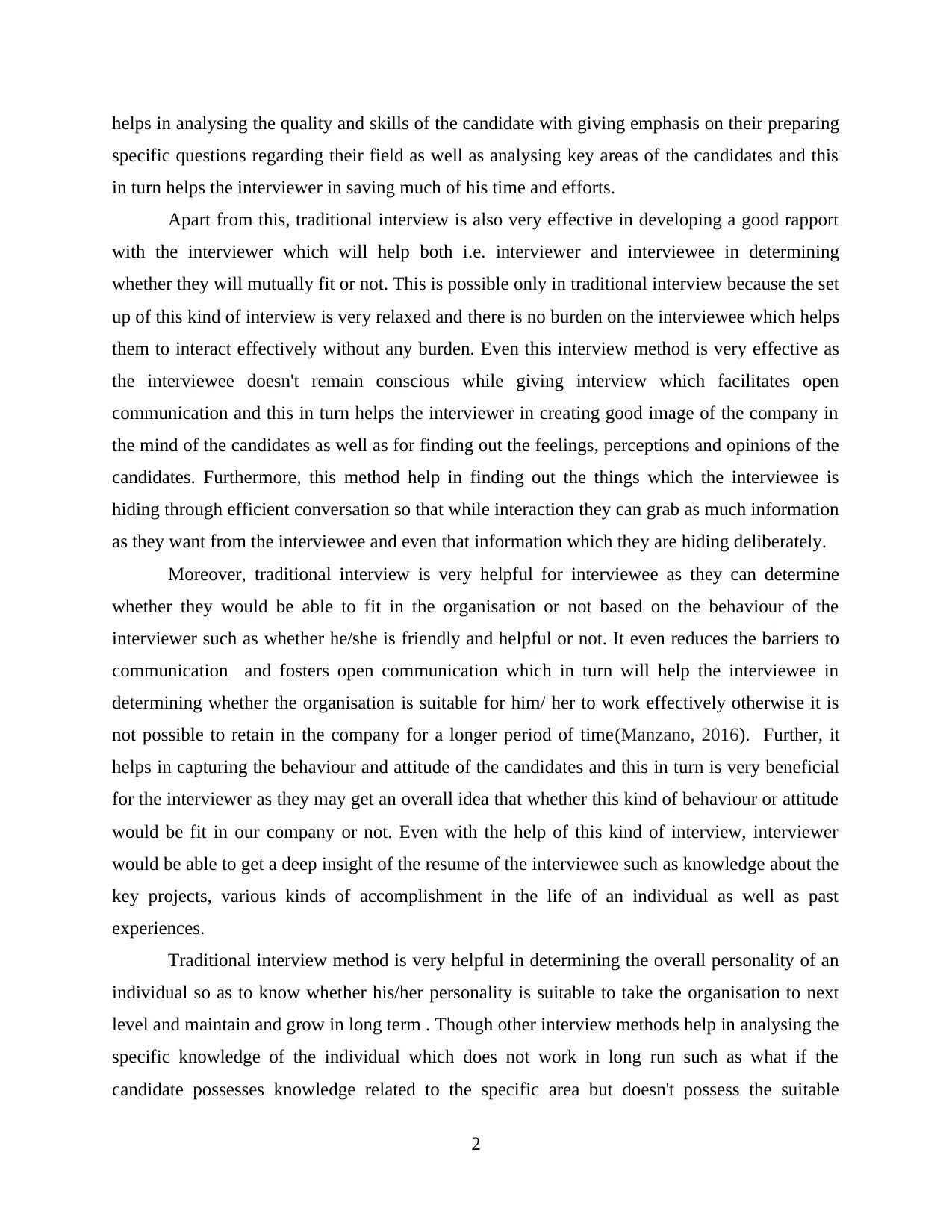
helps in analysing the quality and skills of the candidate with giving emphasis on their preparing
specific questions regarding their field as well as analysing key areas of the candidates and this
in turn helps the interviewer in saving much of his time and efforts.
Apart from this, traditional interview is also very effective in developing a good rapport
with the interviewer which will help both i.e. interviewer and interviewee in determining
whether they will mutually fit or not. This is possible only in traditional interview because the set
up of this kind of interview is very relaxed and there is no burden on the interviewee which helps
them to interact effectively without any burden. Even this interview method is very effective as
the interviewee doesn't remain conscious while giving interview which facilitates open
communication and this in turn helps the interviewer in creating good image of the company in
the mind of the candidates as well as for finding out the feelings, perceptions and opinions of the
candidates. Furthermore, this method help in finding out the things which the interviewee is
hiding through efficient conversation so that while interaction they can grab as much information
as they want from the interviewee and even that information which they are hiding deliberately.
Moreover, traditional interview is very helpful for interviewee as they can determine
whether they would be able to fit in the organisation or not based on the behaviour of the
interviewer such as whether he/she is friendly and helpful or not. It even reduces the barriers to
communication and fosters open communication which in turn will help the interviewee in
determining whether the organisation is suitable for him/ her to work effectively otherwise it is
not possible to retain in the company for a longer period of time(Manzano, 2016). Further, it
helps in capturing the behaviour and attitude of the candidates and this in turn is very beneficial
for the interviewer as they may get an overall idea that whether this kind of behaviour or attitude
would be fit in our company or not. Even with the help of this kind of interview, interviewer
would be able to get a deep insight of the resume of the interviewee such as knowledge about the
key projects, various kinds of accomplishment in the life of an individual as well as past
experiences.
Traditional interview method is very helpful in determining the overall personality of an
individual so as to know whether his/her personality is suitable to take the organisation to next
level and maintain and grow in long term . Though other interview methods help in analysing the
specific knowledge of the individual which does not work in long run such as what if the
candidate possesses knowledge related to the specific area but doesn't possess the suitable
2
specific questions regarding their field as well as analysing key areas of the candidates and this
in turn helps the interviewer in saving much of his time and efforts.
Apart from this, traditional interview is also very effective in developing a good rapport
with the interviewer which will help both i.e. interviewer and interviewee in determining
whether they will mutually fit or not. This is possible only in traditional interview because the set
up of this kind of interview is very relaxed and there is no burden on the interviewee which helps
them to interact effectively without any burden. Even this interview method is very effective as
the interviewee doesn't remain conscious while giving interview which facilitates open
communication and this in turn helps the interviewer in creating good image of the company in
the mind of the candidates as well as for finding out the feelings, perceptions and opinions of the
candidates. Furthermore, this method help in finding out the things which the interviewee is
hiding through efficient conversation so that while interaction they can grab as much information
as they want from the interviewee and even that information which they are hiding deliberately.
Moreover, traditional interview is very helpful for interviewee as they can determine
whether they would be able to fit in the organisation or not based on the behaviour of the
interviewer such as whether he/she is friendly and helpful or not. It even reduces the barriers to
communication and fosters open communication which in turn will help the interviewee in
determining whether the organisation is suitable for him/ her to work effectively otherwise it is
not possible to retain in the company for a longer period of time(Manzano, 2016). Further, it
helps in capturing the behaviour and attitude of the candidates and this in turn is very beneficial
for the interviewer as they may get an overall idea that whether this kind of behaviour or attitude
would be fit in our company or not. Even with the help of this kind of interview, interviewer
would be able to get a deep insight of the resume of the interviewee such as knowledge about the
key projects, various kinds of accomplishment in the life of an individual as well as past
experiences.
Traditional interview method is very helpful in determining the overall personality of an
individual so as to know whether his/her personality is suitable to take the organisation to next
level and maintain and grow in long term . Though other interview methods help in analysing the
specific knowledge of the individual which does not work in long run such as what if the
candidate possesses knowledge related to the specific area but doesn't possess the suitable
2
Paraphrase This Document
Need a fresh take? Get an instant paraphrase of this document with our AI Paraphraser
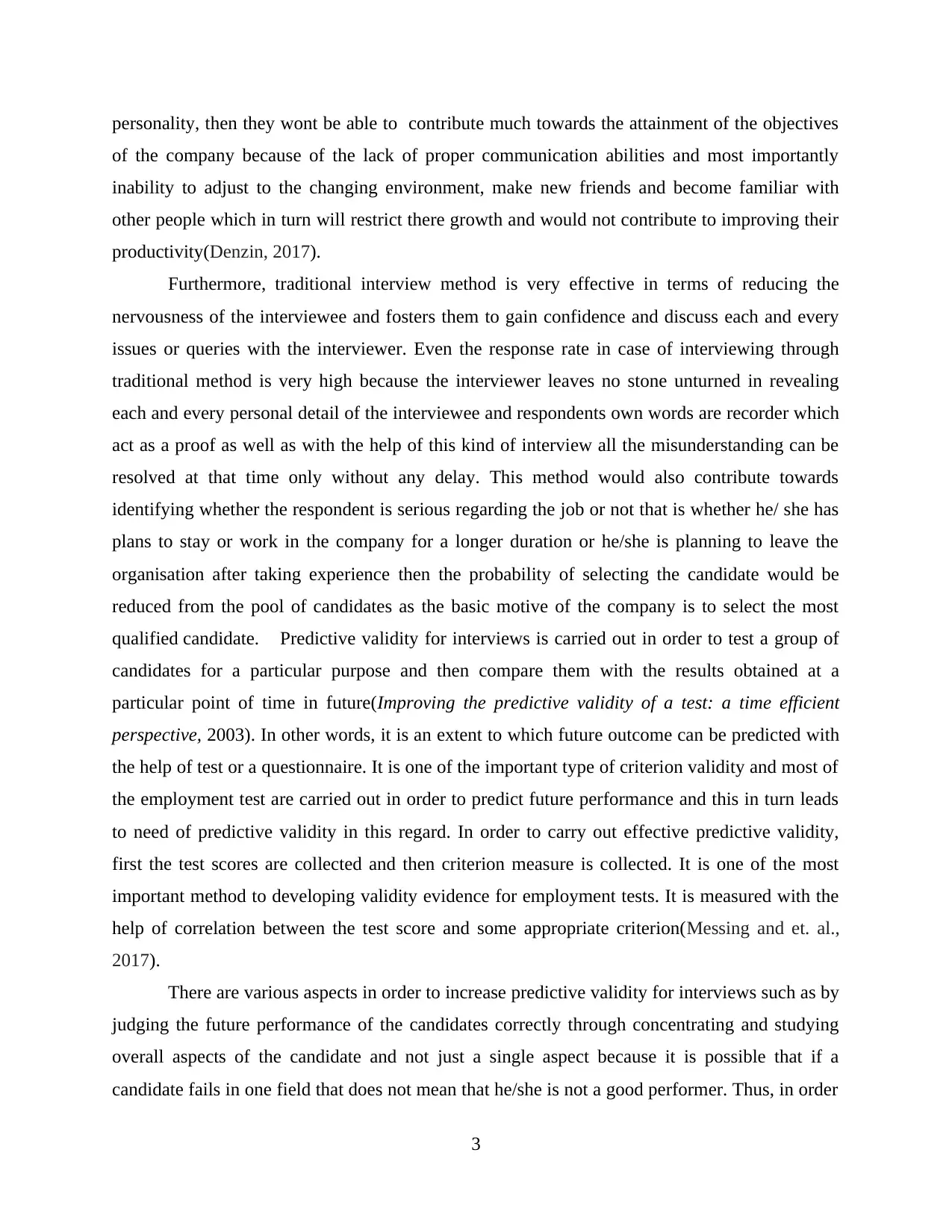
personality, then they wont be able to contribute much towards the attainment of the objectives
of the company because of the lack of proper communication abilities and most importantly
inability to adjust to the changing environment, make new friends and become familiar with
other people which in turn will restrict there growth and would not contribute to improving their
productivity(Denzin, 2017).
Furthermore, traditional interview method is very effective in terms of reducing the
nervousness of the interviewee and fosters them to gain confidence and discuss each and every
issues or queries with the interviewer. Even the response rate in case of interviewing through
traditional method is very high because the interviewer leaves no stone unturned in revealing
each and every personal detail of the interviewee and respondents own words are recorder which
act as a proof as well as with the help of this kind of interview all the misunderstanding can be
resolved at that time only without any delay. This method would also contribute towards
identifying whether the respondent is serious regarding the job or not that is whether he/ she has
plans to stay or work in the company for a longer duration or he/she is planning to leave the
organisation after taking experience then the probability of selecting the candidate would be
reduced from the pool of candidates as the basic motive of the company is to select the most
qualified candidate. Predictive validity for interviews is carried out in order to test a group of
candidates for a particular purpose and then compare them with the results obtained at a
particular point of time in future(Improving the predictive validity of a test: a time efficient
perspective, 2003). In other words, it is an extent to which future outcome can be predicted with
the help of test or a questionnaire. It is one of the important type of criterion validity and most of
the employment test are carried out in order to predict future performance and this in turn leads
to need of predictive validity in this regard. In order to carry out effective predictive validity,
first the test scores are collected and then criterion measure is collected. It is one of the most
important method to developing validity evidence for employment tests. It is measured with the
help of correlation between the test score and some appropriate criterion(Messing and et. al.,
2017).
There are various aspects in order to increase predictive validity for interviews such as by
judging the future performance of the candidates correctly through concentrating and studying
overall aspects of the candidate and not just a single aspect because it is possible that if a
candidate fails in one field that does not mean that he/she is not a good performer. Thus, in order
3
of the company because of the lack of proper communication abilities and most importantly
inability to adjust to the changing environment, make new friends and become familiar with
other people which in turn will restrict there growth and would not contribute to improving their
productivity(Denzin, 2017).
Furthermore, traditional interview method is very effective in terms of reducing the
nervousness of the interviewee and fosters them to gain confidence and discuss each and every
issues or queries with the interviewer. Even the response rate in case of interviewing through
traditional method is very high because the interviewer leaves no stone unturned in revealing
each and every personal detail of the interviewee and respondents own words are recorder which
act as a proof as well as with the help of this kind of interview all the misunderstanding can be
resolved at that time only without any delay. This method would also contribute towards
identifying whether the respondent is serious regarding the job or not that is whether he/ she has
plans to stay or work in the company for a longer duration or he/she is planning to leave the
organisation after taking experience then the probability of selecting the candidate would be
reduced from the pool of candidates as the basic motive of the company is to select the most
qualified candidate. Predictive validity for interviews is carried out in order to test a group of
candidates for a particular purpose and then compare them with the results obtained at a
particular point of time in future(Improving the predictive validity of a test: a time efficient
perspective, 2003). In other words, it is an extent to which future outcome can be predicted with
the help of test or a questionnaire. It is one of the important type of criterion validity and most of
the employment test are carried out in order to predict future performance and this in turn leads
to need of predictive validity in this regard. In order to carry out effective predictive validity,
first the test scores are collected and then criterion measure is collected. It is one of the most
important method to developing validity evidence for employment tests. It is measured with the
help of correlation between the test score and some appropriate criterion(Messing and et. al.,
2017).
There are various aspects in order to increase predictive validity for interviews such as by
judging the future performance of the candidates correctly through concentrating and studying
overall aspects of the candidate and not just a single aspect because it is possible that if a
candidate fails in one field that does not mean that he/she is not a good performer. Thus, in order
3
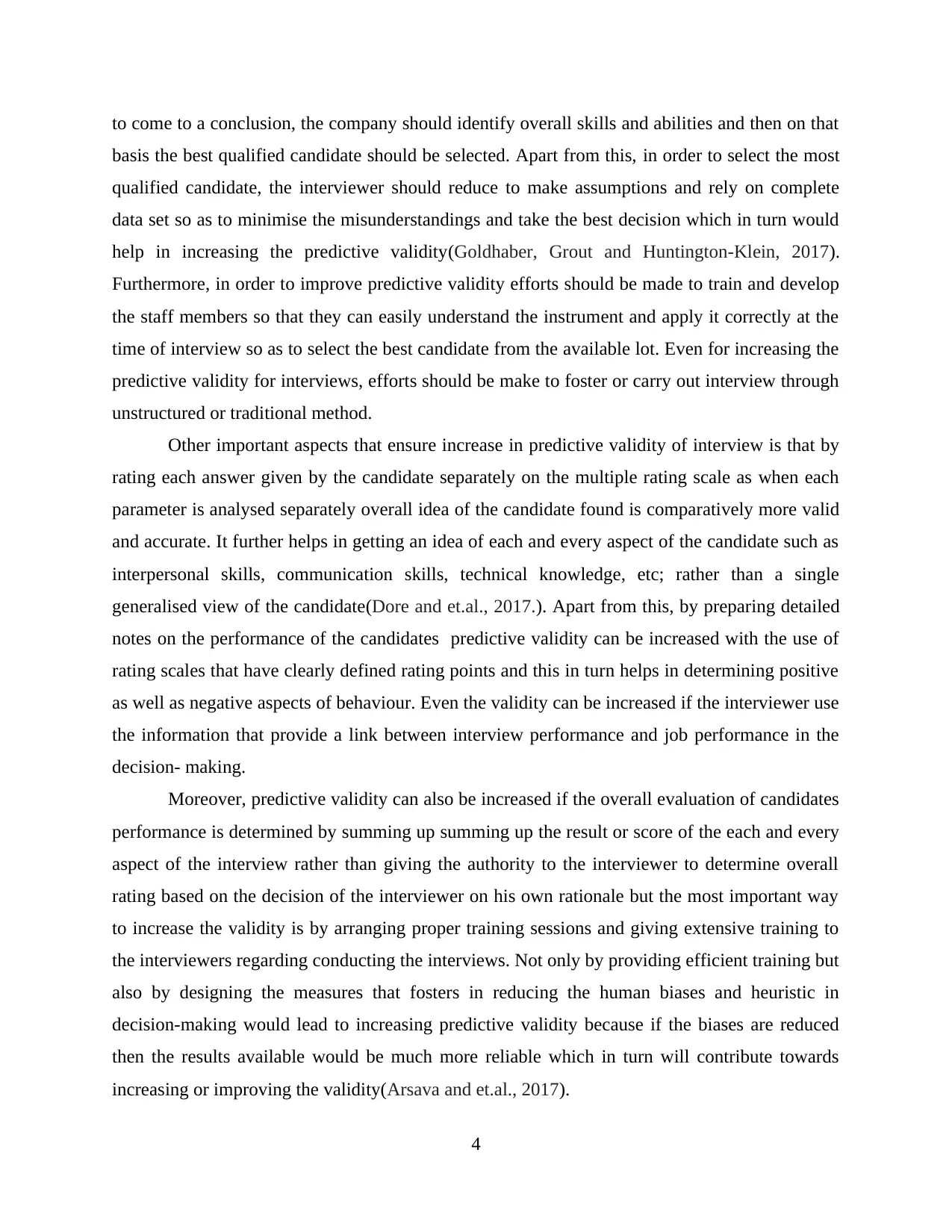
to come to a conclusion, the company should identify overall skills and abilities and then on that
basis the best qualified candidate should be selected. Apart from this, in order to select the most
qualified candidate, the interviewer should reduce to make assumptions and rely on complete
data set so as to minimise the misunderstandings and take the best decision which in turn would
help in increasing the predictive validity(Goldhaber, Grout and Huntington-Klein, 2017).
Furthermore, in order to improve predictive validity efforts should be made to train and develop
the staff members so that they can easily understand the instrument and apply it correctly at the
time of interview so as to select the best candidate from the available lot. Even for increasing the
predictive validity for interviews, efforts should be make to foster or carry out interview through
unstructured or traditional method.
Other important aspects that ensure increase in predictive validity of interview is that by
rating each answer given by the candidate separately on the multiple rating scale as when each
parameter is analysed separately overall idea of the candidate found is comparatively more valid
and accurate. It further helps in getting an idea of each and every aspect of the candidate such as
interpersonal skills, communication skills, technical knowledge, etc; rather than a single
generalised view of the candidate(Dore and et.al., 2017.). Apart from this, by preparing detailed
notes on the performance of the candidates predictive validity can be increased with the use of
rating scales that have clearly defined rating points and this in turn helps in determining positive
as well as negative aspects of behaviour. Even the validity can be increased if the interviewer use
the information that provide a link between interview performance and job performance in the
decision- making.
Moreover, predictive validity can also be increased if the overall evaluation of candidates
performance is determined by summing up summing up the result or score of the each and every
aspect of the interview rather than giving the authority to the interviewer to determine overall
rating based on the decision of the interviewer on his own rationale but the most important way
to increase the validity is by arranging proper training sessions and giving extensive training to
the interviewers regarding conducting the interviews. Not only by providing efficient training but
also by designing the measures that fosters in reducing the human biases and heuristic in
decision-making would lead to increasing predictive validity because if the biases are reduced
then the results available would be much more reliable which in turn will contribute towards
increasing or improving the validity(Arsava and et.al., 2017).
4
basis the best qualified candidate should be selected. Apart from this, in order to select the most
qualified candidate, the interviewer should reduce to make assumptions and rely on complete
data set so as to minimise the misunderstandings and take the best decision which in turn would
help in increasing the predictive validity(Goldhaber, Grout and Huntington-Klein, 2017).
Furthermore, in order to improve predictive validity efforts should be made to train and develop
the staff members so that they can easily understand the instrument and apply it correctly at the
time of interview so as to select the best candidate from the available lot. Even for increasing the
predictive validity for interviews, efforts should be make to foster or carry out interview through
unstructured or traditional method.
Other important aspects that ensure increase in predictive validity of interview is that by
rating each answer given by the candidate separately on the multiple rating scale as when each
parameter is analysed separately overall idea of the candidate found is comparatively more valid
and accurate. It further helps in getting an idea of each and every aspect of the candidate such as
interpersonal skills, communication skills, technical knowledge, etc; rather than a single
generalised view of the candidate(Dore and et.al., 2017.). Apart from this, by preparing detailed
notes on the performance of the candidates predictive validity can be increased with the use of
rating scales that have clearly defined rating points and this in turn helps in determining positive
as well as negative aspects of behaviour. Even the validity can be increased if the interviewer use
the information that provide a link between interview performance and job performance in the
decision- making.
Moreover, predictive validity can also be increased if the overall evaluation of candidates
performance is determined by summing up summing up the result or score of the each and every
aspect of the interview rather than giving the authority to the interviewer to determine overall
rating based on the decision of the interviewer on his own rationale but the most important way
to increase the validity is by arranging proper training sessions and giving extensive training to
the interviewers regarding conducting the interviews. Not only by providing efficient training but
also by designing the measures that fosters in reducing the human biases and heuristic in
decision-making would lead to increasing predictive validity because if the biases are reduced
then the results available would be much more reliable which in turn will contribute towards
increasing or improving the validity(Arsava and et.al., 2017).
4
⊘ This is a preview!⊘
Do you want full access?
Subscribe today to unlock all pages.

Trusted by 1+ million students worldwide
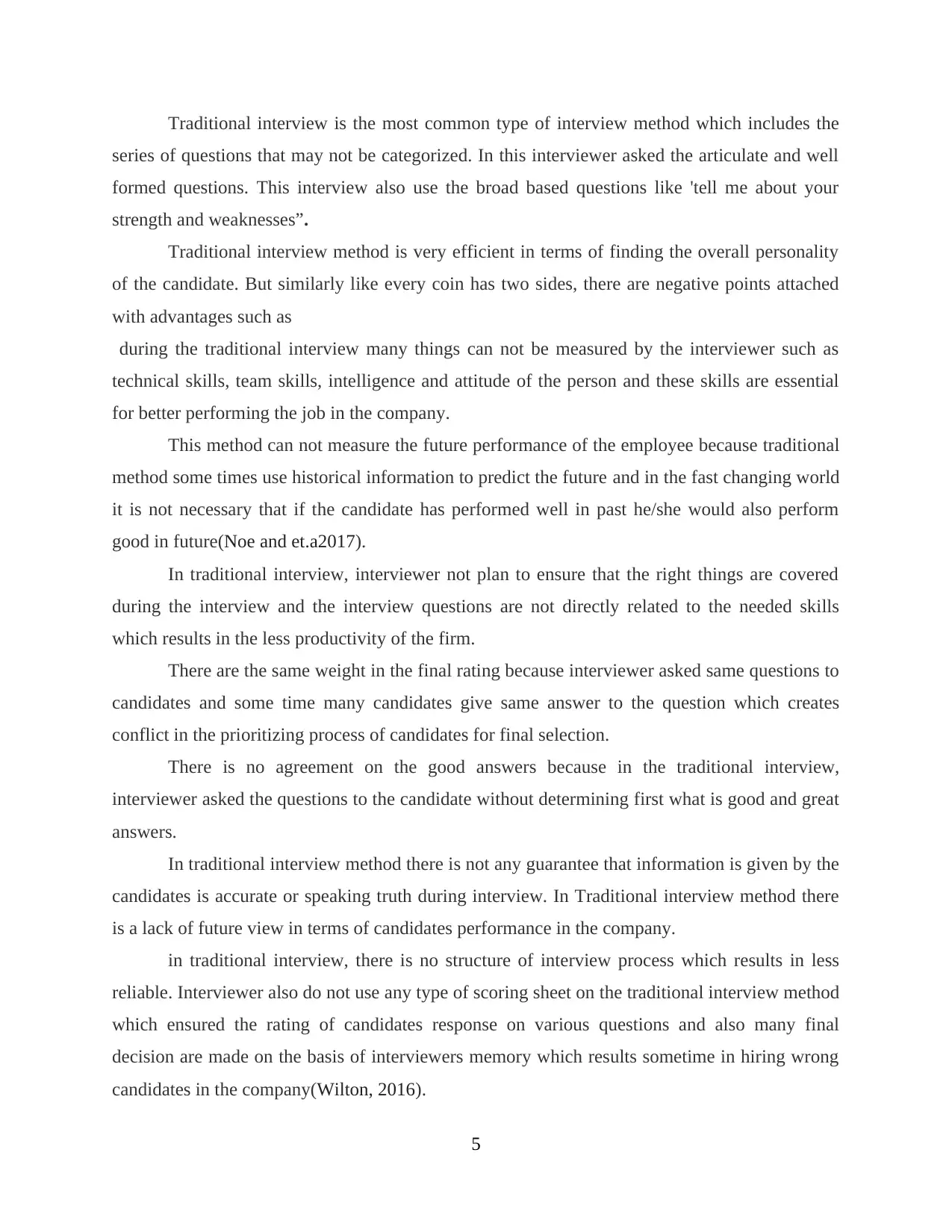
Traditional interview is the most common type of interview method which includes the
series of questions that may not be categorized. In this interviewer asked the articulate and well
formed questions. This interview also use the broad based questions like 'tell me about your
strength and weaknesses”.
Traditional interview method is very efficient in terms of finding the overall personality
of the candidate. But similarly like every coin has two sides, there are negative points attached
with advantages such as
during the traditional interview many things can not be measured by the interviewer such as
technical skills, team skills, intelligence and attitude of the person and these skills are essential
for better performing the job in the company.
This method can not measure the future performance of the employee because traditional
method some times use historical information to predict the future and in the fast changing world
it is not necessary that if the candidate has performed well in past he/she would also perform
good in future(Noe and et.a2017).
In traditional interview, interviewer not plan to ensure that the right things are covered
during the interview and the interview questions are not directly related to the needed skills
which results in the less productivity of the firm.
There are the same weight in the final rating because interviewer asked same questions to
candidates and some time many candidates give same answer to the question which creates
conflict in the prioritizing process of candidates for final selection.
There is no agreement on the good answers because in the traditional interview,
interviewer asked the questions to the candidate without determining first what is good and great
answers.
In traditional interview method there is not any guarantee that information is given by the
candidates is accurate or speaking truth during interview. In Traditional interview method there
is a lack of future view in terms of candidates performance in the company.
in traditional interview, there is no structure of interview process which results in less
reliable. Interviewer also do not use any type of scoring sheet on the traditional interview method
which ensured the rating of candidates response on various questions and also many final
decision are made on the basis of interviewers memory which results sometime in hiring wrong
candidates in the company(Wilton, 2016).
5
series of questions that may not be categorized. In this interviewer asked the articulate and well
formed questions. This interview also use the broad based questions like 'tell me about your
strength and weaknesses”.
Traditional interview method is very efficient in terms of finding the overall personality
of the candidate. But similarly like every coin has two sides, there are negative points attached
with advantages such as
during the traditional interview many things can not be measured by the interviewer such as
technical skills, team skills, intelligence and attitude of the person and these skills are essential
for better performing the job in the company.
This method can not measure the future performance of the employee because traditional
method some times use historical information to predict the future and in the fast changing world
it is not necessary that if the candidate has performed well in past he/she would also perform
good in future(Noe and et.a2017).
In traditional interview, interviewer not plan to ensure that the right things are covered
during the interview and the interview questions are not directly related to the needed skills
which results in the less productivity of the firm.
There are the same weight in the final rating because interviewer asked same questions to
candidates and some time many candidates give same answer to the question which creates
conflict in the prioritizing process of candidates for final selection.
There is no agreement on the good answers because in the traditional interview,
interviewer asked the questions to the candidate without determining first what is good and great
answers.
In traditional interview method there is not any guarantee that information is given by the
candidates is accurate or speaking truth during interview. In Traditional interview method there
is a lack of future view in terms of candidates performance in the company.
in traditional interview, there is no structure of interview process which results in less
reliable. Interviewer also do not use any type of scoring sheet on the traditional interview method
which ensured the rating of candidates response on various questions and also many final
decision are made on the basis of interviewers memory which results sometime in hiring wrong
candidates in the company(Wilton, 2016).
5
Paraphrase This Document
Need a fresh take? Get an instant paraphrase of this document with our AI Paraphraser
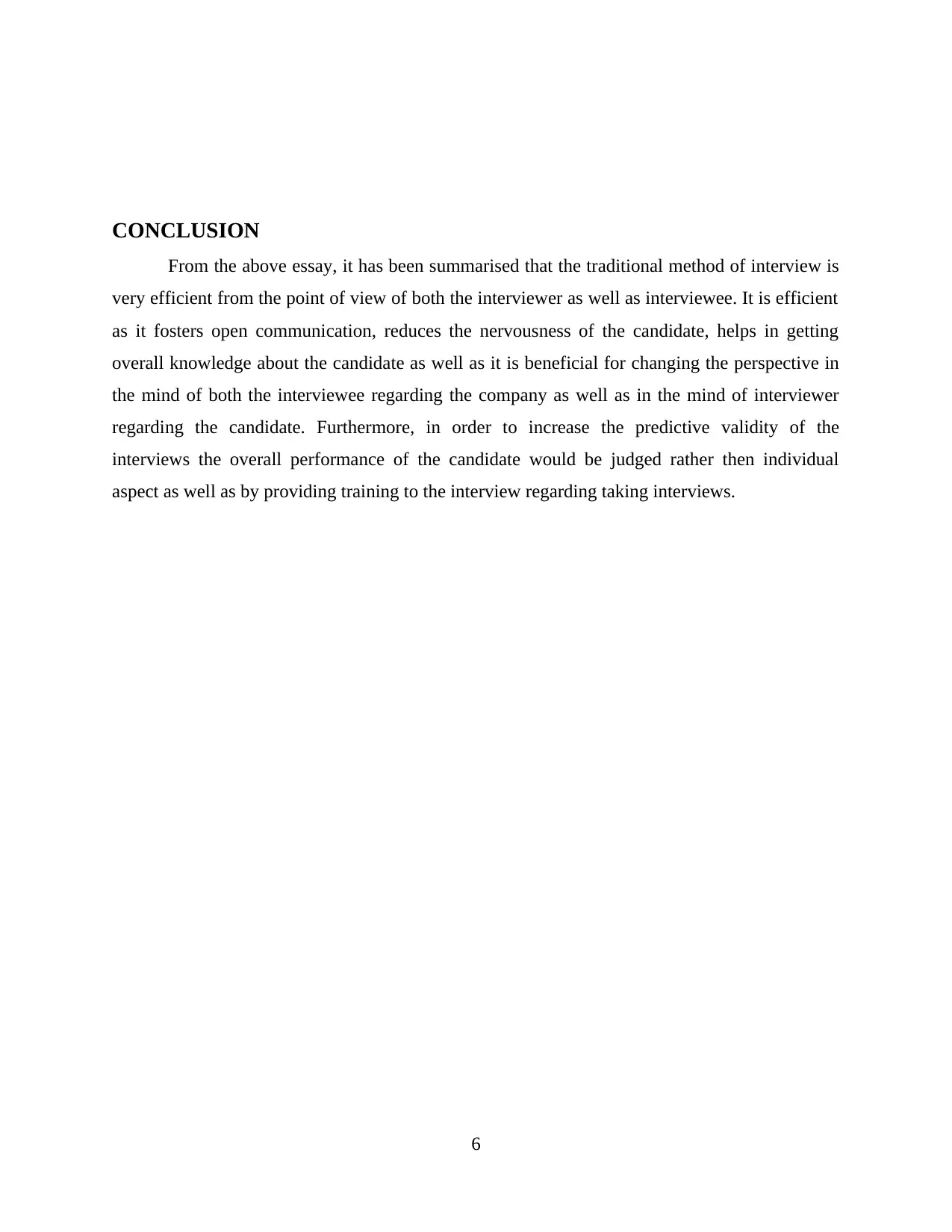
CONCLUSION
From the above essay, it has been summarised that the traditional method of interview is
very efficient from the point of view of both the interviewer as well as interviewee. It is efficient
as it fosters open communication, reduces the nervousness of the candidate, helps in getting
overall knowledge about the candidate as well as it is beneficial for changing the perspective in
the mind of both the interviewee regarding the company as well as in the mind of interviewer
regarding the candidate. Furthermore, in order to increase the predictive validity of the
interviews the overall performance of the candidate would be judged rather then individual
aspect as well as by providing training to the interview regarding taking interviews.
6
From the above essay, it has been summarised that the traditional method of interview is
very efficient from the point of view of both the interviewer as well as interviewee. It is efficient
as it fosters open communication, reduces the nervousness of the candidate, helps in getting
overall knowledge about the candidate as well as it is beneficial for changing the perspective in
the mind of both the interviewee regarding the company as well as in the mind of interviewer
regarding the candidate. Furthermore, in order to increase the predictive validity of the
interviews the overall performance of the candidate would be judged rather then individual
aspect as well as by providing training to the interview regarding taking interviews.
6
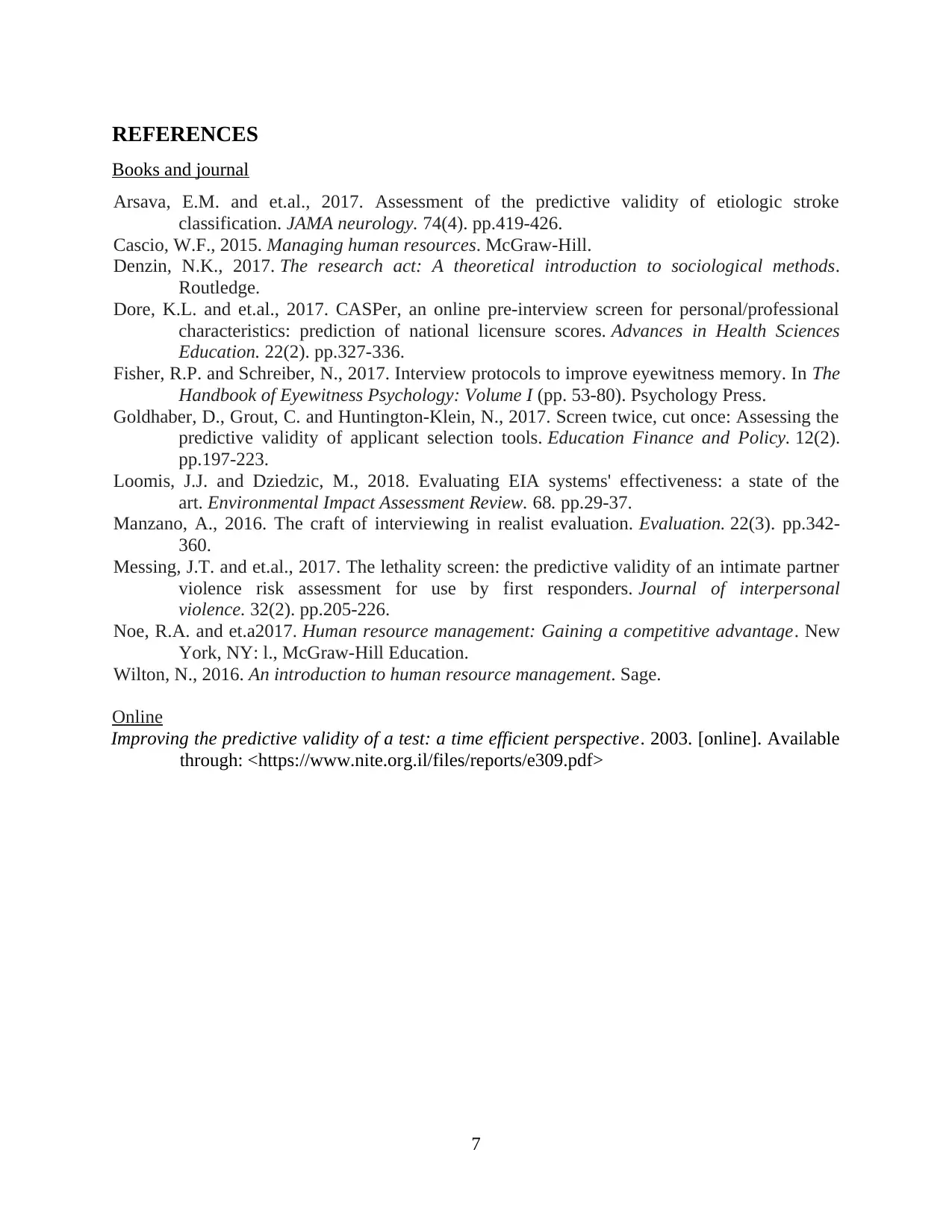
REFERENCES
Books and journal
Arsava, E.M. and et.al., 2017. Assessment of the predictive validity of etiologic stroke
classification. JAMA neurology. 74(4). pp.419-426.
Cascio, W.F., 2015. Managing human resources. McGraw-Hill.
Denzin, N.K., 2017. The research act: A theoretical introduction to sociological methods.
Routledge.
Dore, K.L. and et.al., 2017. CASPer, an online pre-interview screen for personal/professional
characteristics: prediction of national licensure scores. Advances in Health Sciences
Education. 22(2). pp.327-336.
Fisher, R.P. and Schreiber, N., 2017. Interview protocols to improve eyewitness memory. In The
Handbook of Eyewitness Psychology: Volume I (pp. 53-80). Psychology Press.
Goldhaber, D., Grout, C. and Huntington-Klein, N., 2017. Screen twice, cut once: Assessing the
predictive validity of applicant selection tools. Education Finance and Policy. 12(2).
pp.197-223.
Loomis, J.J. and Dziedzic, M., 2018. Evaluating EIA systems' effectiveness: a state of the
art. Environmental Impact Assessment Review. 68. pp.29-37.
Manzano, A., 2016. The craft of interviewing in realist evaluation. Evaluation. 22(3). pp.342-
360.
Messing, J.T. and et.al., 2017. The lethality screen: the predictive validity of an intimate partner
violence risk assessment for use by first responders. Journal of interpersonal
violence. 32(2). pp.205-226.
Noe, R.A. and et.a2017. Human resource management: Gaining a competitive advantage. New
York, NY: l., McGraw-Hill Education.
Wilton, N., 2016. An introduction to human resource management. Sage.
Online
Improving the predictive validity of a test: a time efficient perspective. 2003. [online]. Available
through: <https://www.nite.org.il/files/reports/e309.pdf>
7
Books and journal
Arsava, E.M. and et.al., 2017. Assessment of the predictive validity of etiologic stroke
classification. JAMA neurology. 74(4). pp.419-426.
Cascio, W.F., 2015. Managing human resources. McGraw-Hill.
Denzin, N.K., 2017. The research act: A theoretical introduction to sociological methods.
Routledge.
Dore, K.L. and et.al., 2017. CASPer, an online pre-interview screen for personal/professional
characteristics: prediction of national licensure scores. Advances in Health Sciences
Education. 22(2). pp.327-336.
Fisher, R.P. and Schreiber, N., 2017. Interview protocols to improve eyewitness memory. In The
Handbook of Eyewitness Psychology: Volume I (pp. 53-80). Psychology Press.
Goldhaber, D., Grout, C. and Huntington-Klein, N., 2017. Screen twice, cut once: Assessing the
predictive validity of applicant selection tools. Education Finance and Policy. 12(2).
pp.197-223.
Loomis, J.J. and Dziedzic, M., 2018. Evaluating EIA systems' effectiveness: a state of the
art. Environmental Impact Assessment Review. 68. pp.29-37.
Manzano, A., 2016. The craft of interviewing in realist evaluation. Evaluation. 22(3). pp.342-
360.
Messing, J.T. and et.al., 2017. The lethality screen: the predictive validity of an intimate partner
violence risk assessment for use by first responders. Journal of interpersonal
violence. 32(2). pp.205-226.
Noe, R.A. and et.a2017. Human resource management: Gaining a competitive advantage. New
York, NY: l., McGraw-Hill Education.
Wilton, N., 2016. An introduction to human resource management. Sage.
Online
Improving the predictive validity of a test: a time efficient perspective. 2003. [online]. Available
through: <https://www.nite.org.il/files/reports/e309.pdf>
7
⊘ This is a preview!⊘
Do you want full access?
Subscribe today to unlock all pages.

Trusted by 1+ million students worldwide
1 out of 9
Related Documents
Your All-in-One AI-Powered Toolkit for Academic Success.
+13062052269
info@desklib.com
Available 24*7 on WhatsApp / Email
![[object Object]](/_next/static/media/star-bottom.7253800d.svg)
Unlock your academic potential
Copyright © 2020–2026 A2Z Services. All Rights Reserved. Developed and managed by ZUCOL.





